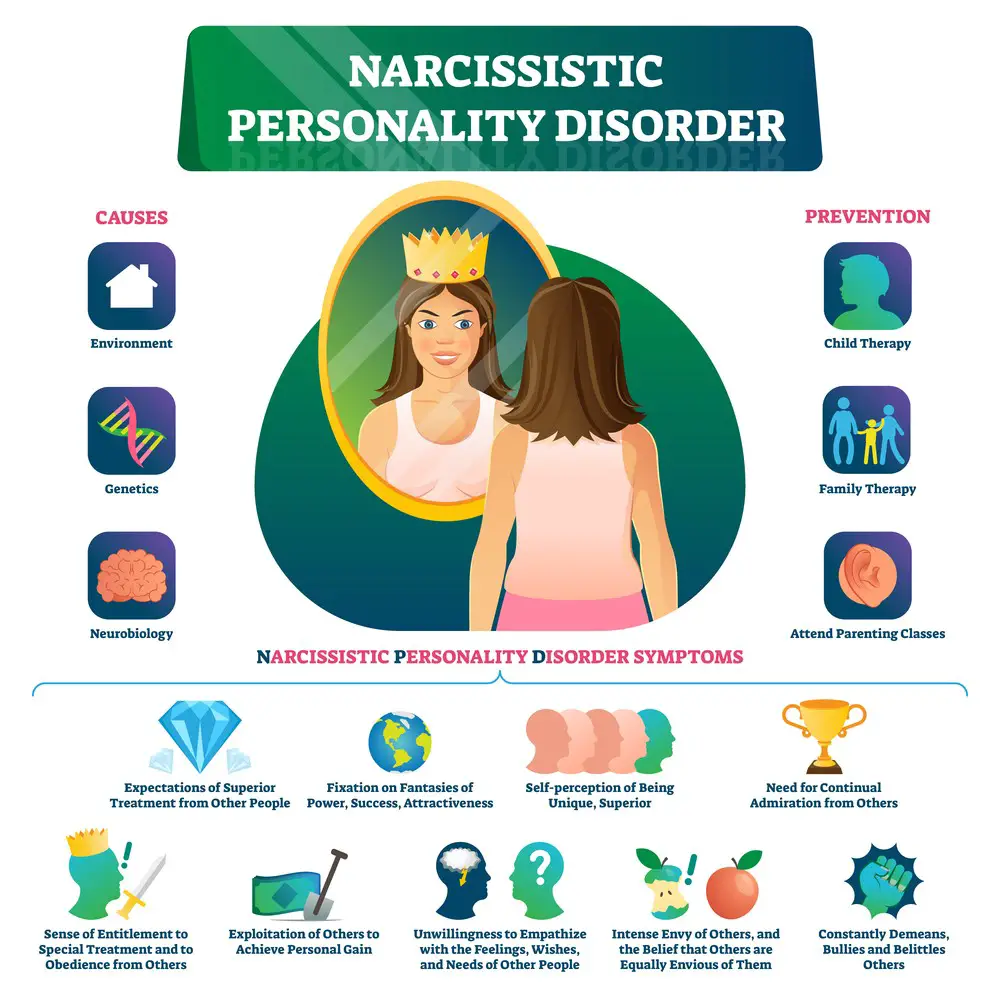As a BetterHelp affiliate, we receive compensation from BetterHelp if you purchase products or services through the links provided
Raising children can be as challenging as it is rewarding, and every parent wants to help their child grow up with a positive sense of self and well-adjusted behavior. However, sometimes, the nurturing we provide can have unintended consequences, such as developing narcissistic traits in children. In this article, we will discuss strategies for raising a child with healthy self-esteem while avoiding the pitfalls that can contribute to narcissistic tendencies.
Understanding the roots of narcissism and how it manifests in children is the first step in preventing its development. By recognizing the signs of narcissism at an early age, parents can take appropriate measures to ensure a balanced upbringing. Addressing the issue with compassion, setting healthy boundaries, and providing positive reinforcement are key strategies for cultivating a supportive environment that fosters self-esteem without breeding narcissism.
Key Takeaways
- Recognize early signs of narcissism in children to take appropriate measures.
- Address the issue with compassion and set healthy boundaries to nurture balanced self-esteem.
- Encourage positive reinforcement and teach coping skills for handling criticism and failure.

Understanding Narcissism
Narcissism is a personality trait that centers around an inflated sense of self, often accompanied by a lack of empathy and a tendency for grandiose thinking. Narcissistic Personality Disorder (NPD) is a more severe form of this trait and is classified as a personality disorder. It’s important to understand that while everyone may exhibit some narcissistic traits occasionally, NPD is a pervasive and enduring pattern that deeply impacts a person’s life.
People with high self-esteem might also see themselves as worthy, but the key difference is that they don’t need constant external validation to maintain their self-worth. In contrast, narcissists rely heavily on external sources to bolster their ego.
There are a few aspects to consider when trying to identify narcissism:
- Grandiosity: Narcissists have an exaggerated sense of their importance and abilities. They believe they are superior, even if they haven’t achieved anything noteworthy.
- Need for admiration: Narcissists commonly crave praise, recognition, and admiration. Compliments boost their fragile self-esteem, and they may go to great lengths to get them.
- Lack of empathy: Narcissists tend to lack empathy for others, making it difficult to understand or genuinely care about other people’s emotions and needs.
It’s essential to be aware of these traits when raising a child, as nurturing their self-esteem is vital to their development. However, fostering a balanced sense of self-worth and avoiding excessive attention that may lead to narcissistic tendencies is crucial.
To minimize the chances of raising a narcissist, consider the following tips:
- Teach empathy: Encourage your child to understand and respect the feelings and perspectives of others. This helps develop emotional intelligence and counters the self-obsession often associated with narcissism.
- Set boundaries: Establish limits on attention-seeking or self-aggrandizing behavior. Make it clear that excessive self-focus is unacceptable and everyone’s needs and feelings matter.
- Celebrate effort, not achievement: Focus on praising the hard work and perseverance your child puts into their activities rather than just their accomplishments. This can help prevent the development of grandiose thinking.
Remember, the goal is to raise a child who feels confident but remains compassionate and connected to others. By understanding narcissism, you can be better equipped to promote a healthy sense of self in your child.
 Recognizing Narcissism in Children
Recognizing Narcissism in Children
It’s essential to recognize the signs of narcissism in children and differentiate them from typical childish behaviors. Here are a few indicators that your child might be displaying narcissistic traits:
- Sense of entitlement: A child with narcissistic tendencies may consistently demand special treatment or feel they deserve rewards and praise without earning or working for them.
- Lack of empathy: Narcissistic children often find it difficult to empathize with the feelings and needs of others. They might struggle to recognize or understand how their actions could affect those around them.
- Exaggerated self-importance: A narcissistic child may believe they’re superior to others and demonstrate a grandiose sense of self-importance, often exaggerating their achievements and abilities.
- Extreme reactions to boredom or failure: Children with narcissistic traits may become unbearably bored in situations that they don’t find stimulating or may react dramatically to minor failures or setbacks.
- Patterns of aggression: A narcissistic child may exhibit aggressive behavior, especially when their sense of self-worth is threatened. This can manifest as verbal or physical aggression towards peers or adults.
To help address and minimize narcissistic traits in children, consider implementing the following strategies:
- Teach empathy: Encourage your child to put themselves in someone else’s shoes and understand their feelings. Practicing active listening and proactively discussing how their actions may affect others can be a great way to build empathy.
- Promote realistic self-assessment: Help your child understand that nobody is perfect and flaws are okay. Please encourage them to recognize their strengths and weaknesses while maintaining a grounded sense of self-importance.
- Establish limits and enforce consequences: Set boundaries for your child’s behavior, clarify the consequences of crossing those boundaries, and consistently enforce those consequences. This helps them understand that actions have consequences and can encourage a sense of responsibility.
- Model healthy relationships: One of the best ways to help your child develop into an empathetic and grounded person is to model healthy relationships yourself. Show respect, kindness, and empathy towards others; your child is likelier to adopt those behaviors.
 The Narcissist Raising Mistakes and Their Impacts
The Narcissist Raising Mistakes and Their Impacts
As a parent, you want to raise your child to be a well-adjusted and empathetic individual. However, sometimes parenting practices can inadvertently contribute to raising a narcissist. This section will explore common mistakes and their impacts on your child’s development.
One of the first mistakes parents may make is coddling their child. Excessively catering to their needs and shielding them from lifes challenges can lead to narcissistic tendencies, as the child might feel entitled to special treatment. On the other hand, parental overvaluation can also contribute to narcissism. Overvaluing is when a parent constantly praises their child, leading the child to develop an inflated sense of self. Here are a few actions to watch out for:
- Always insisting on your child being the center of attention
- Praising without specific, earned achievements
- Excusing all of your child’s actions, even when they’re at fault
These actions can cause children to become entitled, feel they deserve special treatment, and have the right to step on others to maintain their status. This behavior can lead to a child bullying others, lacking empathy, and having difficulty forming meaningful relationships.
Such narcissistic tendencies may also contribute to various mental health issues, including suicide and generational trauma. Children raised by narcissistic parents may suffer low self-esteem, high anxiety, or depression.
To avoid these pitfalls, try incorporating these strategies in your parenting:
- Differentiate your child from yourself and promote their separate identity
- Praise them appropriately based on specific, earned achievements
- Help your child develop empathy by encouraging emotional awareness
Remember, your ultimate goal is to help your child become a healthy, empathetic adult. By being mindful of the parenting practices mentioned above, you can reduce the chances of raising a narcissist and help lay the foundation for your child’s bright and successful future.

Impacts of Overindulgence and Overvaluation
When raising children, striking the right balance between encouraging and setting boundaries is essential. Overindulgence and overvaluation can inadvertently lead to the development of narcissistic tendencies in children. In this section, we’ll cover the impacts of these parenting behaviors and discuss how using them can hinder the development of a well-rounded personality.
Overindulgence involves providing a child with excessive material, emotional support, or praise. While it may seem like a sign of love, overindulgence can contribute to a sense of entitlement and the belief that they are superior to others. Children who are overindulged often:
- Struggle with healthy relationships
- Believe that they deserve admiration without putting in the effort
- Have difficulties handling constructive criticism
On the other hand, parental overvaluation involves placing a child on a pedestal and constantly validating their thoughts, needs, and opinions above others. By overvaluing children, parents inadvertently drive them to constantly seek external validation, as they feel it’s the key to being worthy. This can lead to:
- A constant need for praise and attention from others
- An inability to form genuine connections, as relationships, become a means to feed their ego
- The belief that they should always be the center of attention
To prevent raising a child with narcissistic tendencies, it’s essential to create a balance. Some strategies that can help maintain that balance are:
- Providing appropriate praise: Acknowledge your child’s achievements realistically and encourage them to take responsibility for successes and failures.
- Encouraging empathy: Teach the importance of considering others’ feelings and needs and try to model this behavior.
- Setting boundaries and enforcing consequences: Ensure your child knows the limits and the consequences of their actions. Consistency is crucial for effectively enforcing boundaries.
By understanding the impacts of overindulgence and overvaluation, you can avoid these parenting pitfalls and create a healthy environment for your child to grow into a well-adjusted and empathetic individual. Balancing love, support, and boundaries is crucial for raising confident, considerate, and respectful children.
Addressing the Issue with Compassion
Compassion is important in helping your child develop healthy relationships and empathy, which can counteract narcissistic tendencies. Remember to take a balanced approach and avoid showering them with excessive praise or attention. Here’s how you can instill compassion and kindness in your child:
- Model empathy: Show your child how to care about others by being an empathetic parent. Respond to their needs appropriately and validate their feelings and emotions. You can set an example by demonstrating empathy towards others daily, such as caring for an elderly neighbor or volunteering at a local charity.
- Encourage kindness: Provide opportunities for your child to engage in acts of kindness, big and small. This can be anything from helping with household chores to participating in community service activities. Praise their genuine efforts to be helpful and kind to others.
- Teach emotional intelligence: Guide your child in recognizing and understanding their emotions. Help them learn to express their feelings healthily and how to identify the emotions of others. This will foster emotional intelligence, which is crucial for building healthy relationships.
- Discuss other perspectives: Encourage your child to consider other people’s situations, feelings, and viewpoints. Discussing different perspectives can help in fostering empathy and understanding. For example, you might say, “How do you think your friend felt when you took the toy without asking?”
- Promote healthy friendships: Pay attention to your child’s interactions with their peers. Encourage them to cultivate positive, supportive friendships and to act respectfully in their relationships. Model healthy boundaries and communication skills so they can better navigate their social world.
Integrating these strategies into your parenting can help your child build the foundations for a compassionate and empathetic adulthood, reducing the risk of developing narcissistic traits.
 Setting Healthy Boundaries
Setting Healthy Boundaries
Setting healthy boundaries is crucial in raising children who do not grow up to become narcissists. Maintaining these boundaries demonstrates respect for your child’s autonomy and helps them develop a sense of responsibility. Here are some strategies to set healthy boundaries while raising your children:
- Encourage your child’s independence by offering choices and allowing them to make decisions appropriate for their age. This will promote their sense of autonomy without fostering entitlement.
- Establish clear limits for your child’s behavior. Make sure they understand the consequences of crossing these boundaries. Consistency is key; you should be firm but fair in enforcing these limits.
- Practice effective communication with your child. This includes active listening and expressing your feelings and thoughts with respect and empathy. Encourage your child to do the same.
- Working with your partner to establish and enforce healthy boundaries is important in co-parenting situations. Be open to compromise and maintain a united front regarding disciplinary actions.
- When co-parenting with a narcissist, it’s crucial to maintain strict boundaries and not allow the narcissistic parent to manipulate you or the child. Ensure your child can access love, support, and guidance from positive role models.
You’ll empower your child to grow into a responsible, empathetic adult by fostering a strong, supportive environment with healthy boundaries.
Healthy Practices for Building Self-Esteem
Promoting healthy self-esteem in your child without crossing the line into narcissism is important. Here are some ways to do just that:
1. Praise effort, not just talent: When you praise your child, be specific about what they’ve done and focus on their effort rather than innate talents. For instance, instead of saying, “You’re so smart,” say, “You worked hard on that problem, and it paid off.”
2. Encourage cooperation over winning: Teach your child the value of teamwork and emphasize the importance of cooperating with others. This helps them understand that success isn’t solely about individual achievement but also about working together towards a common goal.
3. Validate their feelings without overemphasizing their worthiness: Listen to your child when they express their emotions, and acknowledge their feelings. You can validate their emotions without inflating their sense of self-importance. For example, say, “I understand that you’re upset, but remember that not getting your way doesn’t mean you’re not worthy.”
4. Set realistic expectations: Help your child set achievable goals and understand that everyone has strengths and weaknesses. This will allow them to learn from their mistakes and recognize that it’s okay to not always be the best at everything.
5. Promote empathy: Encourage your child to put themselves in other people’s shoes and understand their feelings. This helps them develop empathy, an essential skill for building healthy relationships and countering narcissistic tendencies.
By focusing on these practices, you’ll help your child develop a healthy sense of self-esteem without fostering narcissistic traits. Remember, the key is to strike a balance between validation, warmth, and realism.
Handling Criticism and Failure
As a parent, teaching your child to handle criticism and failure is essential to preventing the development of narcissistic traits. To do this, follow these guidelines:
- Normalize failure: Make it clear to your child that everyone experiences failure at some point. Emphasize that failing at something does not mean they are a failure as a person. Please share your experiences dealing with failure and how it taught you valuable lessons.
- Encourage persistence: Help your child understand that it’s important to keep trying, even when things don’t go their way. Provide support and encouragement as they learn to persevere through challenging situations.
- Model healthy responses to criticism: Show them how you handle constructive criticism by demonstrating humility and openness to change. Acknowledge where improvements can be made and actively work on them, proving that no one is perfect.
- Teach empathy: Encouraging empathy will help your child better understand how their actions can impact others. This can lead to a greater appreciation for the value of constructive criticism and its role in self-improvement.
By focusing on these strategies, you’ll support your child in handling criticism and failure and foster an environment where they’ll be less likely to develop narcissistic tendencies. Here are key takeaways to remember:
- Normalize failure and share your own experiences
- Encourage persistence and perseverance
- Model a healthy response to constructive criticism
- Teach empathy to understand the impact of their actions on others
Helping a Child with Narcissistic Traits
It’s important to recognize the signs of narcissism in children, as early intervention can help prevent the development of destructive patterns and negative impacts on your child’s life. To help a child with narcissistic traits, consider the following approaches:
- Encourage empathy: Teach your child to consider the feelings of others by discussing emotions and using real-life examples. Ask them to put themselves in another person’s shoes to help them build a sense of empathy.
- Set realistic expectations: Children with narcissistic traits may have unrealistic expectations about achievements and entitlements. Help them understand that success takes effort and that not every desire can or should be fulfilled.
- Praise effort, not just achievements: Focus on the process and encourage perseverance rather than solely praising outcomes. This will help your child learn the value of hard work and develop a growth mindset.
- Promote responsibility: Teach your child to take responsibility for their actions, even if the outcome is unfavorable. This helps them learn from mistakes and become more accountable.
- Establish appropriate boundaries: Set limits on the level of attention and special treatment your child receives. This helps prevent them from developing an inflated sense of self-importance and entitlement.
- Seek professional help: If your child’s narcissistic traits become concerning, consider working with a therapist specializing in narcissism or trauma. They can offer strategies and techniques to address the issue and help your child develop healthier behavior patterns.
Remember, addressing narcissistic traits early on is crucial to help your child avoid potentially damaging consequences in adulthood. You can make a tangible difference in your child’s life by providing guidance, support, and professional assistance when needed.
 Raising Well-Adjusted Kids: A Fine Balance Between Healthy Self-Esteem and Narcissism
Raising Well-Adjusted Kids: A Fine Balance Between Healthy Self-Esteem and Narcissism
Ah, the joys and trials of parenting. You’ve mastered diaper changes and navigated the “terrible twos,” but now you’ve got a growing human with complex emotions. When should you start thinking about your child’s mental health? When do certain behaviors cross from ‘just a phase’ to something requiring professional guidance? Let’s dive in!
Signs Your Child May Need Therapy
It’s essential to differentiate between normal growing pains and behaviors that might indicate a deeper issue. Here are some telltale signs:
- Frequent Mood Swings: Wild emotional ups and downs that don’t have an obvious cause.
- Changes in Behavior: Is your talkative child suddenly silent? That could be a red flag.
- Social Isolation: It may be worth investigating if your social butterfly avoids friends.
- Sudden Underperformance: A drastic change in school performance is often a cry for help.
- Excessive Fear or Anxiety: Especially if it impedes daily life.
 Goals of Therapy for Children
Goals of Therapy for Children
Once you’ve recognized the need, what’s the endgame for therapy?
- Emotional Regulation: Goal number one is teaching kids how to handle their emotions.
- Skill Building: Coping mechanisms, social skills, and problem-solving strategies are often on the agenda.
- Family Dynamics: Sometimes, the child and the family environment are the issue. Therapy can help everyone adapt and grow.
Marking Progress: What to Look For
Tracking your child’s progress in therapy isn’t always straightforward, but some markers can help you see the road ahead:
- Behavioral Shifts: Are tantrums less frequent? Are they making friends again?
- Verbalization: A child expressing feelings is often a sign they’re absorbing therapeutic lessons.
- Academic Improvement: It’s a concrete measure that therapy might be working.
Supporting Your Child in Therapy
- Be Involved: But don’t hover. Your child must feel the therapeutic space is theirs, but they must also know you’re there if needed.
- Open Dialogue: Keep communication lines open, but avoid pressuring them to share everything.
- Celebrate Small Wins: A good grade, a new friend—these are milestones worth celebrating on this journey.
Raising Kids with Balanced Self-Esteem, Not Narcissism
Therapy isn’t a magic wand, but can be a valuable resource. Coupled with a compassionate home environment, setting boundaries, and positive reinforcement, it can foster a balanced self-esteem in your child, avoiding the pitfalls of narcissism.
Remember, it’s crucial to teach kids how to cope with criticism and failure constructively. It doesn’t just build resilience; it helps lay the foundation for a balanced personality that doesn’t tip into narcissism.

Final Thoughts
Parenting is complex; there’s no one-size-fits-all guide. However, recognizing signs of troubling behavior, understanding therapy goals, and marking progress can empower you to be a supportive parent. Because, after all, a balanced child is a happy child—and isn’t that the ultimate goal?
Frequently Asked Questions
How can I prevent narcissistic tendencies in my child?
To prevent narcissistic tendencies in your child, it’s essential to focus on building a strong foundation of empathy and emotional intelligence. Encourage your child to express their emotions and help them understand that others have feelings too. It’s also crucial to set limits, promote their individuality, and balance praise with constructive feedback based on their earned achievements.
What are the signs of a child developing narcissism?
Signs of a child developing narcissism may include:
- A constant need for approval and admiration from others
- An excessive sense of entitlement
- Difficulty handling criticism or being unable to admit mistakes
- Lack of empathy for others
- Exaggerating their abilities and accomplishments
Monitor your child’s behavior closely, and if you notice these traits, consider addressing them through open communication and appropriate guidance.
How can I teach my child empathy to avoid narcissism?
Teaching your child empathy is an essential part of preventing narcissism. Here are a few tips to foster empathy in your child:
- Model empathetic behavior by showing concern for others and discussing feelings openly
- Encourage your child to express their emotions and validate their feelings
- Teach your child to recognize and respect the emotions of others
- Practice active listening and teach your child to do so as well
- Engage in role-playing scenarios to help your child understand different perspectives
What parenting techniques can help me avoid raising a narcissist?
Effective parenting techniques to avoid raising a narcissist include:
- Providing consistent love and support for your child as an individual
- Establishing and enforcing reasonable boundaries and limits
- Praising effort rather than only achievement and giving specific, earned praise
- Encouraging independence and fostering a sense of responsibility
- Teaching empathy and emotional intelligence through open communication and modeling
How can I promote healthy self-esteem in my child without fostering narcissism?
Promoting healthy self-esteem while avoiding narcissism can be achieved by:
- Recognizing and celebrating your child’s strengths and accomplishments in a balanced way
- Encouraging self-reflection and fostering self-awareness
- Focusing on effort and persistence rather than only results
- Teaching resilience and how to handle setbacks constructively
- Building a strong foundation of empathy, which is important for both self-esteem and understanding others
What should I do if I suspect my child is becoming narcissistic?
If you suspect your child is becoming narcissistic, take a step back and reflect on your parenting techniques. Identify areas that may need adjustments and implement appropriate changes. Communicate openly about your concerns with your child and work together on fostering empathy, self-awareness, and balance in their lives. If needed, seek guidance from a mental health professional for individualized support and resources.
About Jacob Maslow
After surviving the traumatizing events of 9/11, I took it upon myself to heal through helping others. I’m the primary caregiver of my children and understand from first-hand experience the lonely paths you have to walk as a partner and parent when leaving an unhealthy relationship.
We’re all echoing in a dark space that doesn’t have to be this empty, and that’s been my mission since finding solace and recovery in therapy: To help comfort others who are still in shock and at the prime of their struggle.
I came across BetterHelp after searching for this type of community. I wanted to belong to a body of proactive therapists and supportive therapy veterans that allowed me to see other sides of the story.
It was unconventional, and that’s what attracted me most. During my most challenging times, when my ex-wife completely cut me off from my children, I found comfort and clarity through BetterHelp.
Instead of being chained to a strict therapist recommendation, I was in charge of who I felt understood my struggle most. That allowed me to find my true peace, as I was reunited with those who read behind my words and had first-hand experience with my trauma.
Recovery is a choice; with BetterHelp, that choice will be a few clicks away. You can join their couples-oriented platform, Regain.us for those stuck with family estrangement and toxic relationship patterns.
- Stress Management: What is the Relationship Between Stress and Addiction? - June 28, 2024
- Exploring Techniques to Maintain a Healthy Lifestyle without Drugs - May 28, 2024
- How Acupuncture Helps Treat Chronic Fatigue Syndrome - May 28, 2024
This site contains affiliate links to products. We will receive a commission for purchases made through these links.


 Recognizing Narcissism in Children
Recognizing Narcissism in Children The Narcissist Raising Mistakes and Their Impacts
The Narcissist Raising Mistakes and Their Impacts Setting Healthy Boundaries
Setting Healthy Boundaries
 Raising Well-Adjusted Kids: A Fine Balance Between Healthy Self-Esteem and Narcissism
Raising Well-Adjusted Kids: A Fine Balance Between Healthy Self-Esteem and Narcissism Goals of Therapy for Children
Goals of Therapy for Children


